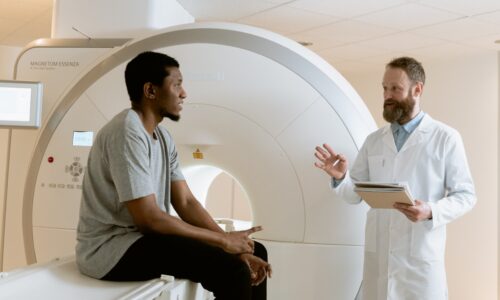Are there new alternatives to screening for colon cancer? |

Guidelines published by the U.S. Preventive Services Task Force recommend that adults ages 50-75 who are at average risk for the development of colon cancer can reasonably be screened by one of three methods: 1) fecal occult blood testing, 2) sigmoidoscopy, or 3) colonoscopy. Fecal occult blood testing involves the use of “cards” onto which a stool sample is placed and tested for the presence of blood which may not be readily apparent. Sigmoidoscopy is a more limited version of colonoscopy in which the lower portion of the colon is viewed using a flexible fiber optic “scope”. Colonoscopy, in which the entire colon is directly visualized, is currently considered to be the “gold standard” for colorectal cancer screening.
In 2014, an alternative to these screening methods was approved by the U.S. Food and Drug Administration (FDA) as well as by the Centers for Medicare & Medicaid Services. This screening method is called Cologuard, and like the fecal occult blood test, is stool-based.
How does Cologuard work? The test detects microscopic amounts of blood in the stool as well as detecting altered DNA that could have been caused by colon cancer or pre-cancer. Cologuard is available only by prescription. It is performed at home by collecting two samples of stool that are sent to a laboratory for analysis.
Who should consider having this test? Screening rates for colon cancer fall below the targets set by the U.S. Centers for Disease Control. Reasons for this include the expense and typically unpleasant nature of preparation for colonoscopy and the requirement that fecal occult blood testing must be repeated on an annual basis. Cologuard represents an alternative for someone who would otherwise not undergo colon cancer screening due to these and other reasons. It should be noted that the test is intended for people who are at average risk for developing colon cancer. It is not currently recommended for those at increased risk, such as someone with a family history of colon cancer or with an inflammatory condition affecting the colon such as ulcerative colitis. People at higher than average risk may require more frequent or a different method of screening.
How accurate is Cologuard? Prior to FDA approval, Cologuard was evaluated in a large clinical trial involving more than 10,000 people. Cologuard was found to detect 92 percent of colorectal cancers as compared to 74 percent of cancers detected using a home-based stool test (Fecal Immunochemical Test–FIT). Cologuard also detected 42 percent of precancerous lesions compared to a 24 percent detection rate with the FIT test. One downside of Cologuard testing is that is has a higher likelihood of a false positive result. This means that the test can come back positive even in the absence of disease. In these cases, follow-up testing with colonoscopy is recommended.
Will this test replace other methods of screening? Colonoscopy remains the best single test for colorectal cancer screening. Not only is the entire length of the colon directly visualized, but the doctor also has the ability to perform biopsies and remove polyps during the procedure. As mentioned previously, Cologuard’s main application may be to provide people who are unable or unwilling to undergo other forms of testing with a reliable screening method. As of now, Cologuard is listed as an acceptable method of screening for colorectal cancer by the American Cancer Society and as an “alternative” method of screening by the USPSTF.
How much will Cologuard cost? Cologuard is a very sophisticated test that will not come cheaply. This is primarily due to the component of the test that looks for abnormal DNA. An estimated cost is somewhere in the $500-650 range. This is much more expensive than the basic stool test costing in the $5-10 range but considerably less than a colonoscopy at around $6000 per procedure.
Article sources:
- USPSTF recommendations regarding colorectal screening
- FDA Press Announcement regarding Cologuard
- Cologuard by Exact Sciences
If you have any more questions just Ask Hanna, our health advisors are here to help.
Image: ©Shutterstock / crystal light








